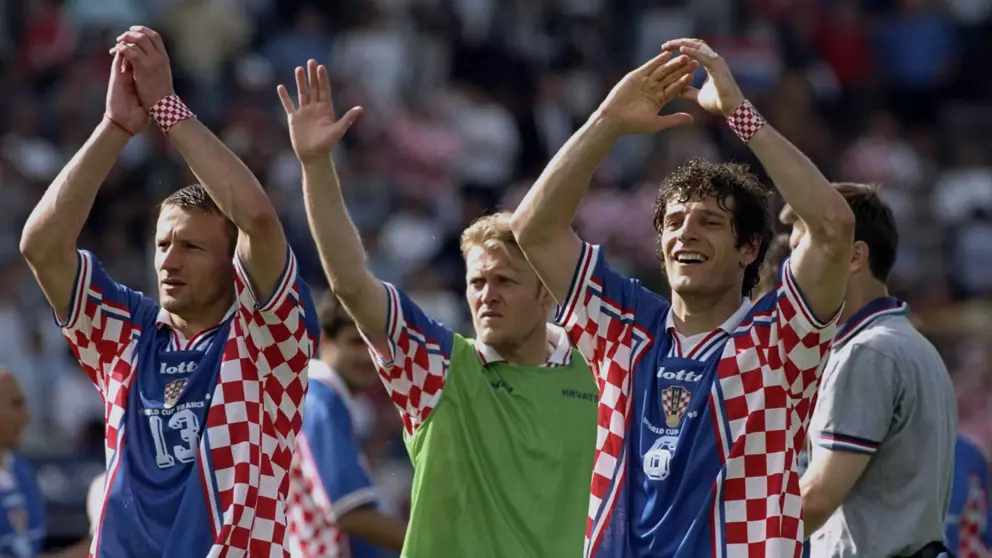
After more than 40 years of operation, DTVE is closing its doors and our website will no longer be updated daily. Thank you for all of your support.
DTVE Interview: James Abraham, commissioning editor, FIFA+

A month after the launch of its platform FIFA+, commissioning editor and content lead for global originals James Abraham talks to Jonathan Easton about the global football body’s ambitions for streaming.
The football season may be at an end, but the football never stops.
This is something that James Abraham, commissioning editor and content lead for global originals at FIFA+, knows very well.
FIFA+ launched last month with the lofty ambition to broadcast over 40,000 live matches per year – over 29,000 men’s matches and over 11,000 women’s matches from 100 member associations across all six confederations – for free by the end of 2022. At launch, 1,400 matches will be livestreamed monthly with that number only set to rise as time goes on.
In addition, also houses documentary programmes on players and countries, such as Ronaldinho: The Happiest Man in the World and Croatia: Defining a Nation. Abraham speaks to Digital TV Europe at a Central London screening of the latter, in which Croatia’s third-place FIFA World Cup 1998 finish is examined against a backdrop of civil war in the former Yugoslavia.
While it is early days and Abraham admits that FIFA has gone with the soft launch approach, the former World Rugby content and programming manager tells DTVE that the launch has “gone pretty well.”
“I think it’s always going to be an awkward moment to launch something so broad,” Abraham says. “And now that cadence will build, and the platform will improve and improve and improve.”
When asked what the mission statement is for FIFA+, Abraham gives a succinct description: “FIFA wanted first and foremost to have a direct relationship with its audience, its consumers.”
He explains that FIFA wants to be closer to fans, with the governing body historically removed from audiences as it sells rights to broadcasters. “I think that’s quite an old-fashioned model now, so the driver here is to create a meaningful relationship with the audience and we’ve decided to do that through content including global originals, through the archive and through information and data on the match centre,” he says.
That archive is almost as impressive as the live offering itself, with the streamer planning to make every single fixture in World Cup history available to watch on demand for free. At launch it only has a choice of classic matches and more recent World Cup fixtures, but English fans will be pleased to see the country’s 1966 World Cup victory over West Germany available in full on a legitimate on-demand platform for the first time.
Abraham also notes that FIFA is building stronger relationships with its member associations (MAs) “to give them part of the platform where they can put their rights there for competitions that they’ve not sold elsewhere.”
FIFA+ doesn’t hold ambitions to rival the likes of Sky Sports or the newly formed tie-up of BT Sport and Eurosport in going after major domestic rights, but Abraham says that it is “giving a platform to those MAs to reach a larger audience.”
In turn, those MAs will receive key data points on viewers which will open new opportunities to them.
He gives the example of a conversation between FIFA and the French MA, where “your tier 2 rights are only going into four or five countries – so here’s a platform where you can send them to the rest of the world.”
“Rights holders are biting our hand off to do it because they can get those numbers back and it helps their commercial case whatever they want to do with those rights down the line,” he says.
The football fan
Describing who FIFA+ is targeted at – asides from the obvious tag of football-interested people – is more difficult than you’d think, Abraham says.
“This is something which we struggled to answer, the exec admits. “I would say, and we always say, any football fan – which is such a broad thing to say, isn’t it? But I think the real truth of it is that different parts of the platform and various parts of the service will have different target markets, and I think that is OK because we are a platform that is ultimately completely free to the user.”
Any comparisons with the likes of DAZN or Premier Sports therefore are slightly unfair, with those paid-for platforms constantly having to prove their value. “I think if we were a subscription platform, that would be a real issue for us,” Abraham says. “But because we’re not, I think that’s kind of okay.”
 In terms of original programming, there are documentaries on current and recent icons like Australian record goal scorer Sam Kerr and a film on the 2018 World Cup which Abraham says target a younger audience. Meanwhile films such as the Croatia documentary are “aimed at a slightly older demographic” but still supply an entry point for younger enthusiasts to learn more about the sport’s history.
In terms of original programming, there are documentaries on current and recent icons like Australian record goal scorer Sam Kerr and a film on the 2018 World Cup which Abraham says target a younger audience. Meanwhile films such as the Croatia documentary are “aimed at a slightly older demographic” but still supply an entry point for younger enthusiasts to learn more about the sport’s history.
Looking ahead, Abraham says that FIFA+’s content roadmap – both in terms of original and live content – has a pipeline through to the end of 2023 with the organisation “already starting to look at 2024 and the ramp up to World Cup 2026 is going to be a really key thing.”
In the more immediate future with the Qatar World Cup 2022 kicking off in November, Abraham says that FIFA is “treading a relatively fine line of not wanting to cannibalise our rights holders and also kind of managing their expectations as to what we want on there as well.”
Abraham hints that FIFA+ could be made the exclusive home of highlights for the upcoming World Cup “in the same way that FIFA used to put those match highlights on YouTube” but he says that this is “literally a live conversation” and “a tricky one.”
Ultimately in terms of the World Cup and going forward, Abraham promises that “wherever we net out, the audience will be at the very centre of that decision. It won’t be based on making money on ads.”
“It won’t be based on anything other than kind of audience experience and kind of wanting to be very respectful for our rights holders who are a massive part of our revenue.”
One thing that Abraham wants to convey is that FIFA+ “is not a vanity platform”. He wants it to provide “actual proper value” to MAs and consumers and “become a bona fide destination for football fans to come and get reliable data, watch games and enjoy really serious factual entertainment.”
FIFA+ is certainly ambitious DTC proposition from the world’s football body, and there’s little reason to doubt that the organisation has the clout and deep pockets to make it a success.




